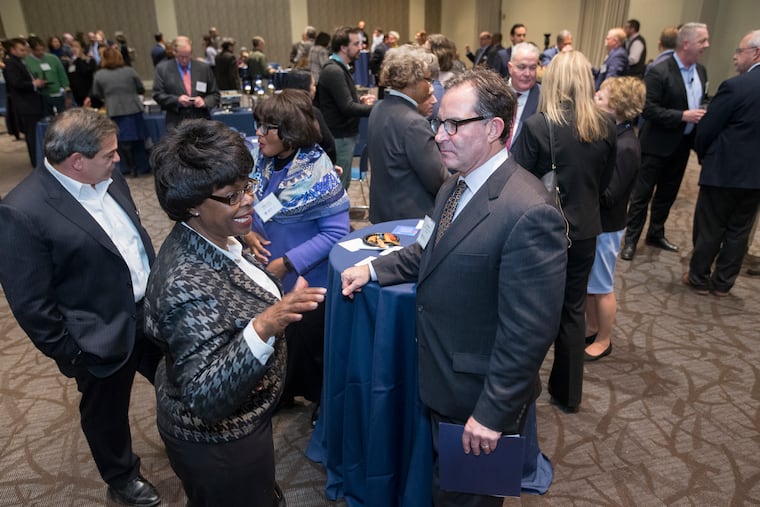‘This is a business proposition … not charity:’ Philly’s eds and meds buy-local program debuts
The inspiration is a 2014 finding by the city Controller's Office that $5.3 billion is spent annually on goods and services by the city's 34 universities and hospitals, with just $2.7 billion of it from businesses located in Philadelphia.

By all accounts, the road ahead will not include quick victories. But the launch Wednesday night of Philadelphia's first citywide initiative to get hospitals and universities to increase their local purchasing of goods and services included an exciting revelation.
Even if it involves doing laundry. Lots of laundry.
"I think by the end of the year we're going to be able to announce that there's going to be a medical laundry coming to Philly for the first time in a very long time," Jeff Hornstein, executive director of the Economy League of Greater Philadelphia, announced to an audience of a couple hundred gathered on the campus of Drexel University for the public unveiling of Philadelphia Anchors for Growth & Equity, or PAGE. It is one of the Economy League's priority projects for the next 10 years.
>> READ MORE: Philadelphia launches push to get hospitals and universities to buy local
Following a path plowed by other cities such as Baltimore, Cleveland, Chicago, and Detroit, PAGE is a collaborative effort to get Philadelphia's dominant economic sector — eds and meds — to help change the city's disturbing narrative as the poorest large U.S. city by flexing its substantial purchasing muscle closer to home.
The inspiration is a 2014 finding by the city Controller's Office that $5.3 billion is spent annually on goods and services by the city's 34 universities and hospitals, with just $2.7 billion of it from businesses located in Philadelphia.
Medical laundry is a prime example, Hornstein told an audience of government officials, heads of institutional purchasing and local business owners. The city's hospitals produce about 50 million pounds of laundry a year.
"And all of that laundry gets exported about a hundred miles every day. It doesn't make any sense. No one likes it. It's just an artifact of the way the supply chains work," Hornstein said. "So if we're able to bring a local laundry to Philadelphia, we could create a few hundred jobs."
That appears to be imminent. While not prepared to release details, Hornstein said the deal — resulting from months of trust-building and data sharing among PAGE's participating medical institutions working in a pilot mode the last 18 months — demonstrates the kind of economic gaps and opportunities PAGE hopes to fill and exploit by getting the city's anchors working together. It is as much to their benefit as it is to local companies.
"This is a business proposition, this is not charity," Hornstein said.
FUNDING NEEDS
Yet, in following the lead of other cities already doing this, PAGE will be looking for a few handouts to sustain and propel what currently is envisioned as a plan to boost eds and meds anchors' local spending by as much as $530 million and create at least 5,000 jobs in eight to 10 years.
"If there are any foundation people who want to write us a big check, we'd be grateful for that," Hornstein said during the two-hour event at Drexel's Behrakis Grand Hall.
Currently, PAGE funding comes from founding partners Children's Hospital of Philadelphia, Thomas Jefferson University Hospitals, Drexel University, University of Pennsylvania, University of Pennsylvania Health System, Temple University, and Temple University Health System, along with the city's Commerce Department.
Other project participants are Community College of Philadelphia, Einstein Healthcare Network, La Salle University, Salus University, St. Joseph's University and University of the Sciences.
ADVICE FROM DOWN I-95
As the keynote speaker, Kurt Sommer, director of Baltimore Integration Partnerships, brought praise and a reality check.
"The hardest work is in front of you," he said, speaking from eight years' experience.
Sommer's insights included:
Goal setting is challenging because institutional capacities differ. "Twenty million or 20 percent means a lot of different things to a lot of different institutions."
Institutions have different business models. Hospitals do a lot of hiring; schools don't. Private schools can be nimble with purchasing; public schools work within a strict regulatory environment.
Challenges to economic inclusion can be overcome by changing the internal culture, staffing to undertake inclusion, deepening community engagement, quantifying qualified firms and finding qualified labor.
Manage expectations. "There are things that won't work. When things don't work, that's the opportunity for innovation."
Economic inclusion promotes the city as a healthier community, fosters increased productivity, keeps more money in local neighborhoods, fosters better relations between institutions and communities, helps companies attract talent and gives employees a sense their work is having a social benefit.
REACTION FROM LOCAL BUSINESS
Phoebe Coles is head of Community Marketing Concepts, a 20-plus-year-old, family- and minority-owned business on City Avenue that, she pointed out to PAGE principals during a Q&A session, pays "every tax that there is." Something the tax-exempt hospitals and schools making up PAGE's participants roster can't say, Coles noted. She pushed for assurances they will buy local.
Julie Ann Jones, assistant vice president of procurement at Drexel, acknowledged not having "all the answers" and noted with exasperation a decided absence of institutional business-side people at a recent national procurement conference.
"Some of this has to be policy-driven and has to be very deliberate," Jones said.
In an interview afterward, Coles said she was "very optimistic" by PAGE's "great start" but remains concerned about accountability.
"My question is, 'How do we hold the feet of these institutions to the fire?'"